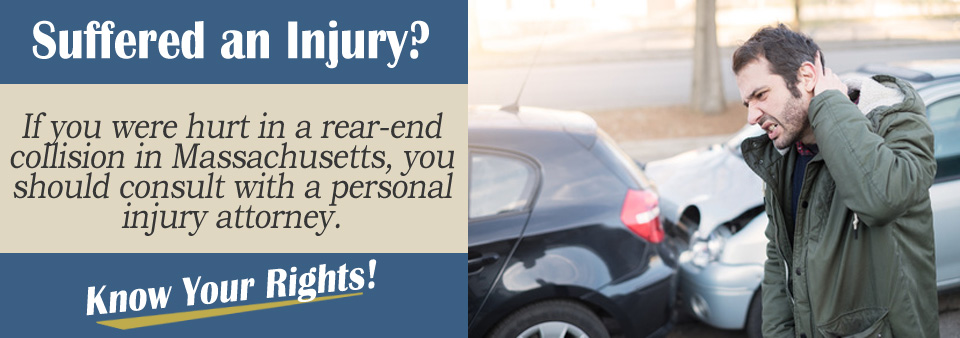A rear end collision can lead to serious injuries or damages. Because Massachusetts is a no-fault state, each driver's insurance takes care of any damages or injuries that resulted from the accident.
Because of the nature of a rear-end collision, the cause of the accident might be investigated further. If the insurance doesn't cover more serious injuries or cover all the damages, you still might be able to pursue a personal injury claim.
You should consult with a Massachusetts personal injury attorney to learn more about your rights and to determine which outlet you should take to recover compensation for your damages.
How Negligence Impacts A Massachusetts Personal Injury Claim
If a driver is more than half to blame for a crash, then you might be able to pursue a personal injury claim. While popular belief is that a rear-end collision is automatically the rear-ender's fault that is not always true.
If you were rear-ended, such as rear-ended while stopped, you must prove that you fulfilled your responsibilities as a driver and that you exercised due care while operating a vehicle. You have to prove that the driver who hit you from behind did not exercise reasonable care and caused the crash and your damages. The state of Massachusetts uses a modified comparative negligence clause to determine car accident liability. So, with that being said, if the other driver was at least 51% to blame for an accident then you can recover damages from the other party.
However, you have to have the right evidence to prove liability. Sometimes that involves eyewitness testimony.

Damages That Might Result From a Rear-End Collision
The damages suffered from a rear-end collision can be significant. Your vehicle will suffer damages to the rear-end. Your car might suffer bumper, truck, and taillight damages. Mechanical damages sometimes result from a hard impact.
You might be injured so you will incur medical expenses and now in the future. Also, you might have lost wages for missed work now and you might miss more work in the future.
Other damages might include pain and suffering, loss of services, loss of enjoyment of life, and mental trauma. Keep documentation that shows your damages and supports your claim against the other party.
Is Massachusetts a No-Fault State?
Every owner of a motor vehicle in Massachusetts must purchase car insurance coverage. Before you enter a formal legal agreement to pay for a car insurance policy, you should understand how Massachusetts mandates the type of insurance coverage you should have.
Is Massachusetts a no-fault state? Has Massachusetts passed a rear collision law? Massachusetts is one of a dozen or so states that follows some type of no-fault car insurance system. Under the no-fault car insurance principle, your car insurance pays for expenses such as medical bills regardless of which party caused the auto collision.
To ensure vehicle owners follow the no-fault legal doctrine, each driver must purchase Personal Injury Protection (PIP), which applies to you as the owner of the motor vehicle involved in a car crash. PIP coverage also applies to any driver that you gave permission to drive your car, as well as every passenger riding in your vehicle and any pedestrian injured because of a vehicle accident.
Massachusetts no-fault insurance covers up to $8,000 in the expenses generated by an auto collision. PIP coverage covers medical bills that directly stem from a car accident and up to 75 percent of the income lost because a car accident caused serious enough injuries to force you out of work. If you cannot complete standard household chores, Massachusetts PIP coverage allows you to pay for someone to provide the standard services required to complete standard household chores.
One important note: Massachusetts PIP coverage does not allow you to receive compensation for pain and suffering. As a type of non-economic monetary award, you can sue the other driver for the financial losses that are associated with pain and suffering.
Is There a Massachusetts Rear End Collison Law?
Massachusetts has not enacted a rear-end collision law. For a vast majority of rear-end accidents, the driver that struck a motor vehicle from behind typically assumes legal liability for causing the rear-end accident. However, Massachusetts follows the comparative negligence legal doctrine, which states each party can assume a percentage of the blame for any type of accident, including a rear-end collision.
For example, let’s assume you file a civil lawsuit for a rear-end collision against the driver of the other vehicle because the driver committed an act of operational negligence. You receive a legal judgment that awards you $20,000 in monetary damages. However, the judge assigns you 20 percent of the blame for causing the accident. Maybe your brake lights did not work properly or you failed to signal before making a turn. The $20,000 in monetary damages decreases to a $16,000 financial award because of the 20 percent of the legal liability that you have assumed.
Comparative Negligence Law for a Rear End Accident
If you have a rear end accident in Massachusetts you need to know that the state is covered by comparative negligence law when it comes to filing a personal injury claim. Under Massachusetts’ comparative negligence law, personal injury victims cannot recover compensation if their negligence is greater than the combined negligence of all of the defendants.
This means that plaintiffs can recover compensation as long as they are less than 51 percent responsible for what happened. This could happen in a rear end accident if you, as the plaintiff, momentarily lost attention and had to brake suddenly to avoid a hazard up front. The vehicle behind may rear end your vehicle because insufficient time is given for it stop.
Burden of Proof
If you are the one filing the personal injury claim, fortunately for you the court will assume that you were the one who was driving carefully. This means the defendant has to prove otherwise if he or she wishes to avoid paying for the rear end damage to your vehicle. Sometimes they use the fact that you have violated a road rule. This is when you need all the available evidence to defend yourself.
Before a decision is reached by the court, blame has to be apportioned between you and the defendants, that totals 100 percent. All you need to do is prove you were in no way to blame for the accident. If you are found to be say 10 percent to blame, this percentage will be removed from your final settlement.
Evidence Required in a Rear End Accident
To help to ensure that you aren’t blamed at all in the rear end accident under Massachusetts comparative negligence law, you not only need to hire an experienced personal injury lawyer but you need to have sufficient evidence to prove you are not to blame.
This means you will need photographs of the rear end accident and the site where the accident took place. If there were any stop signs or traffic lights that may have contributed to the accident these need to be photographed as well.
Sometimes there are video cameras fitted at some locations. Evidence from these can help to determine fault in an accident. As well as photos it helps to have eye witness’ written reports, the police report and if you are injured a medical report written by your physician. This should contain the amount owed for treatment so far and an estimate of future treatment.
Consult With A Massachusetts Personal Injury Attorney
If you have suffered serious injuries in a rear-end collision in Massachusetts, you should consult with an auto accident attorney who can help you determine how to proceed so you can recover damages.
If a personal injury claim is a wise choice, your lawyer will help you get your claim on track and recover compensation for the damages that you suffered. Because personal injury lawyers work on a contingency basis, your lawyer will not be paid until you get a judgment or settlement for your claim.
Schedule a free case evaluation with a Massachusetts personal injury attorney today so you can get your claim on track.
